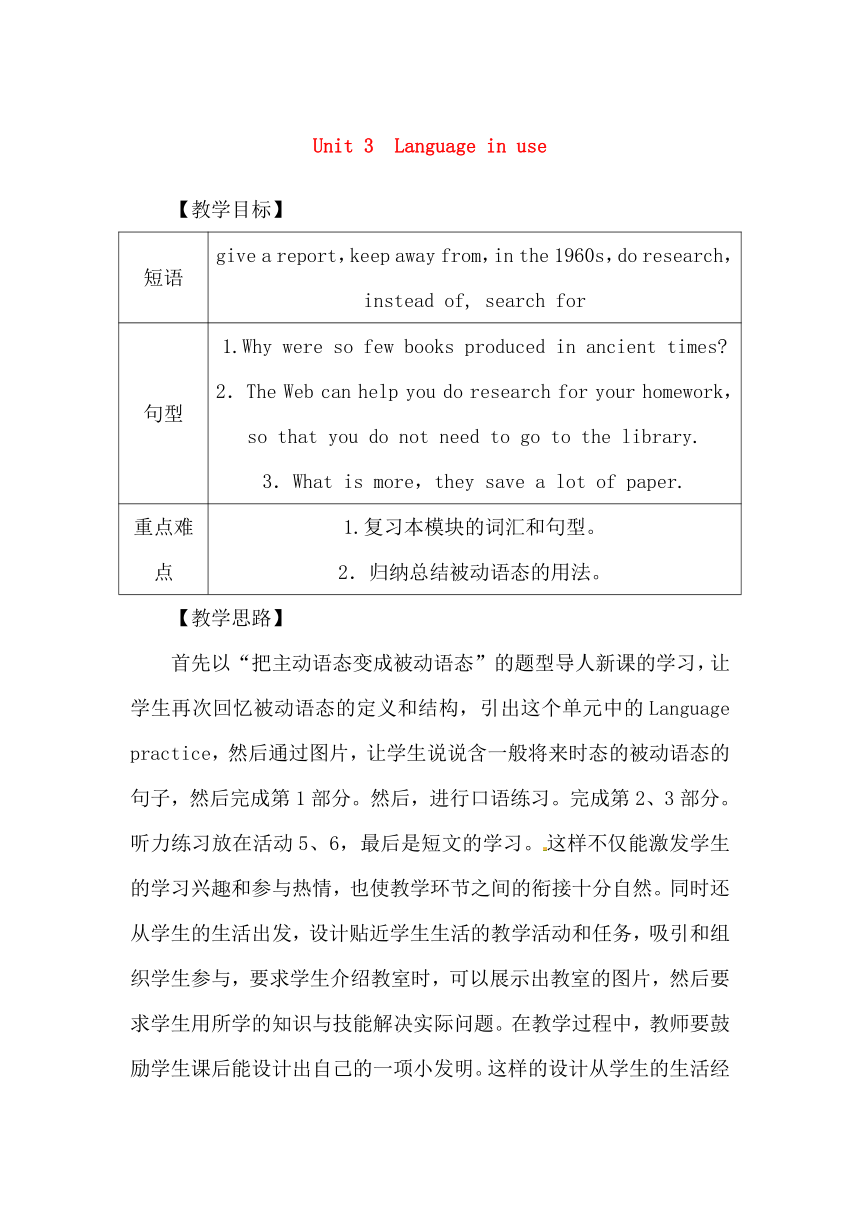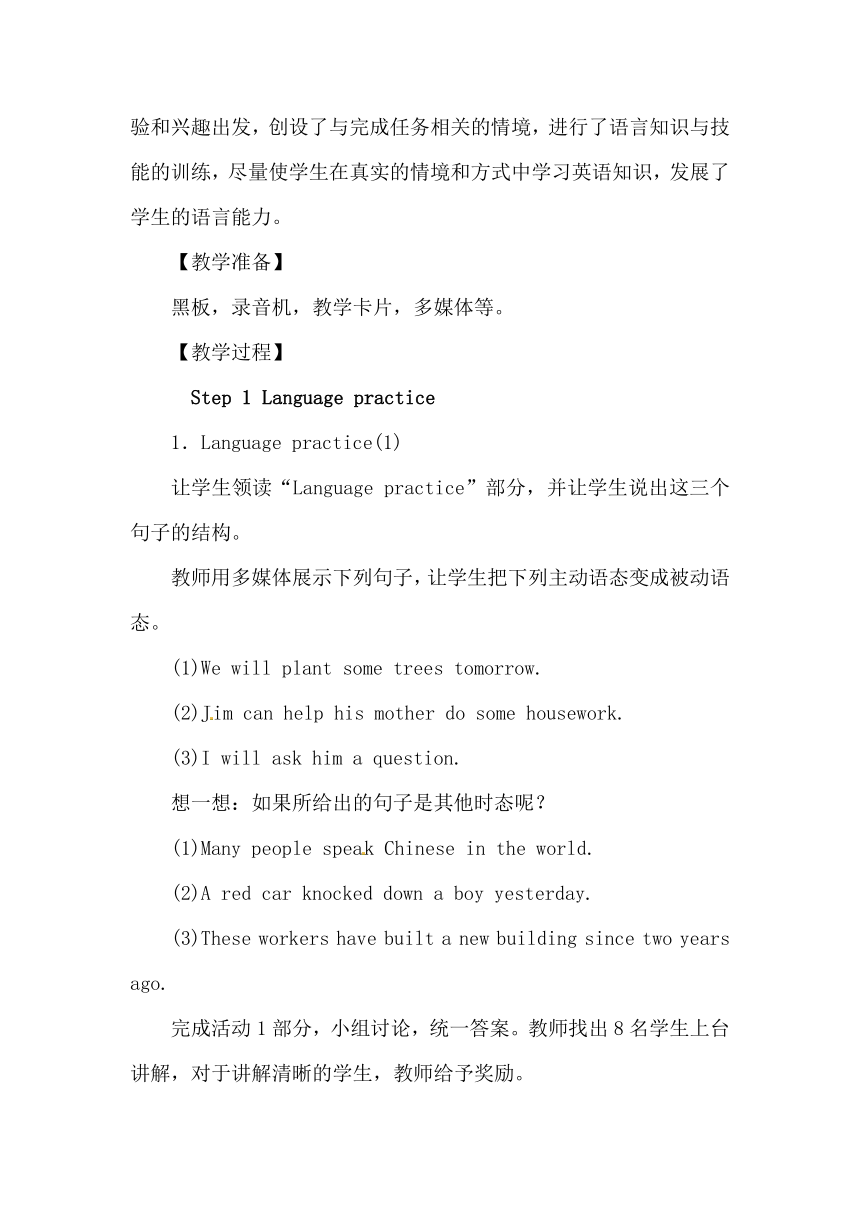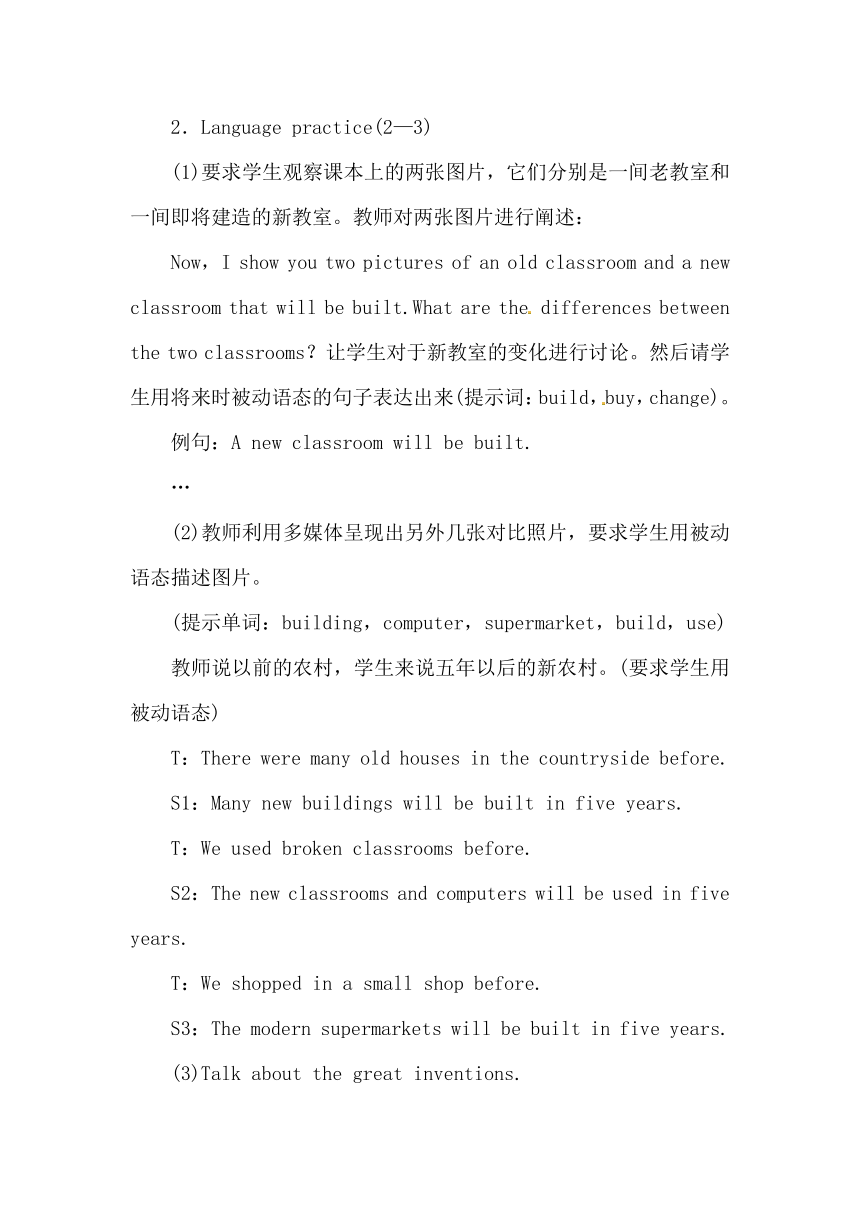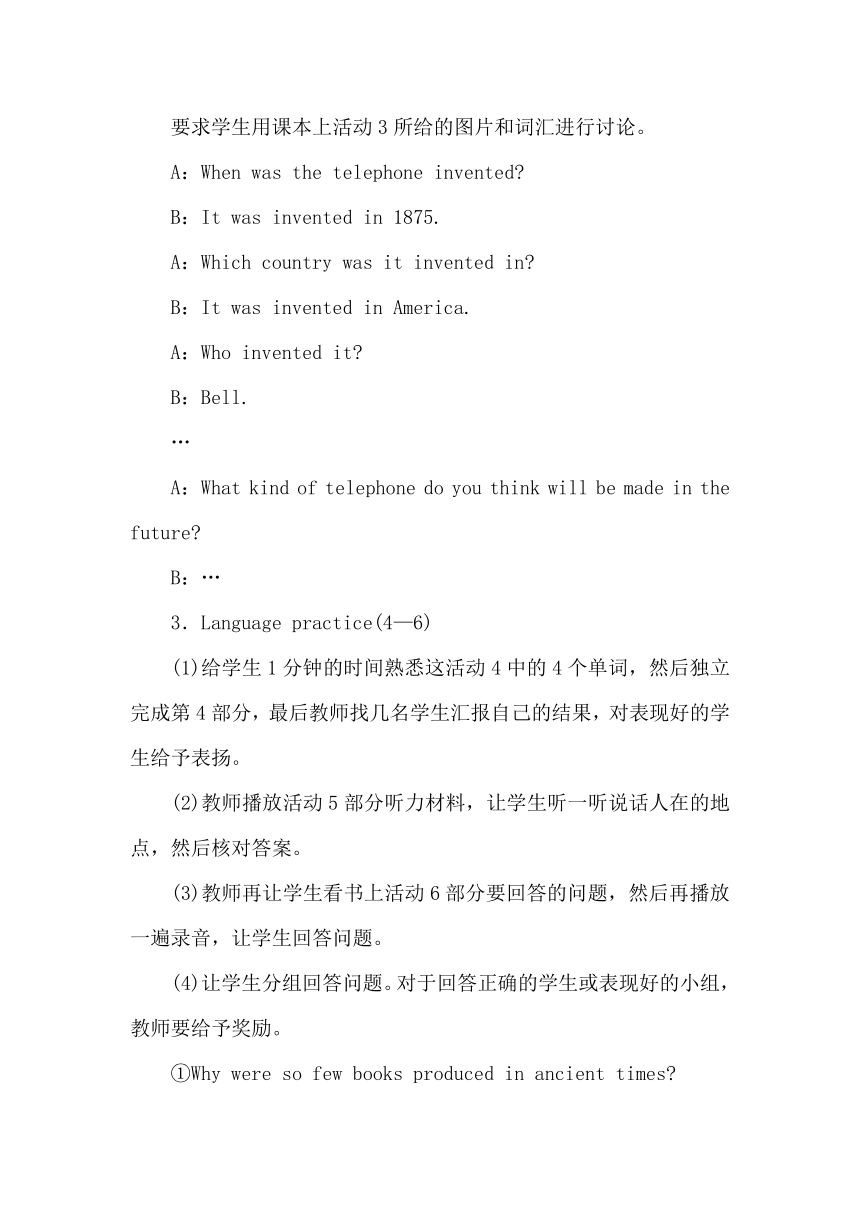外研版九年级英语上册教案Module 9 Great inventions Unit 3
文档属性
| 名称 | 外研版九年级英语上册教案Module 9 Great inventions Unit 3 |

|
|
| 格式 | doc | ||
| 文件大小 | 124.5KB | ||
| 资源类型 | 教案 | ||
| 版本资源 | 外研版 | ||
| 科目 | 英语 | ||
| 更新时间 | 2022-08-08 16:45:10 | ||
图片预览




文档简介
Unit 3 Language in use
【教学目标】
短语 give a report,keep away from,in the 1960s,do research,instead of, search for
句型 1.Why were so few books produced in ancient times 2.The Web can help you do research for your homework,so that you do not need to go to the library.3.What is more,they save a lot of paper.
重点难点 1.复习本模块的词汇和句型。2.归纳总结被动语态的用法。
【教学思路】
首先以“把主动语态变成被动语态”的题型导人新课的学习,让学生再次回忆被动语态的定义和结构,引出这个单元中的Language practice,然后通过图片,让学生说说含一般将来时态的被动语态的句子,然后完成第1部分。然后,进行口语练习。完成第2、3部分。听力练习放在活动5、6,最后是短文的学习。这样不仅能激发学生的学习兴趣和参与热情,也使教学环节之间的衔接十分自然。同时还从学生的生活出发,设计贴近学生生活的教学活动和任务,吸引和组织学生参与,要求学生介绍教室时,可以展示出教室的图片,然后要求学生用所学的知识与技能解决实际问题。在教学过程中,教师要鼓励学生课后能设计出自己的一项小发明。这样的设计从学生的生活经验和兴趣出发,创设了与完成任务相关的情境,进行了语言知识与技能的训练,尽量使学生在真实的情境和方式中学习英语知识,发展了学生的语言能力。
【教学准备】
黑板,录音机,教学卡片,多媒体等。
【教学过程】
Step 1 Language practice
1.Language practice(1)
让学生领读“Language practice”部分,并让学生说出这三个句子的结构。
教师用多媒体展示下列句子,让学生把下列主动语态变成被动语态。
(1)We will plant some trees tomorrow.
(2)Jim can help his mother do some housework.
(3)I will ask him a question.
想一想:如果所给出的句子是其他时态呢?
(1)Many people speak Chinese in the world.
(2)A red car knocked down a boy yesterday.
(3)These workers have built a new building since two years ago.
完成活动1部分,小组讨论,统一答案。教师找出8名学生上台讲解,对于讲解清晰的学生,教师给予奖励。
2.Language practice(2—3)
(1)要求学生观察课本上的两张图片,它们分别是一间老教室和一间即将建造的新教室。教师对两张图片进行阐述:
Now,I show you two pictures of an old classroom and a new classroom that will be built.What are the differences between the two classrooms?让学生对于新教室的变化进行讨论。然后请学生用将来时被动语态的句子表达出来(提示词:build,buy,change)。
例句:A new classroom will be built.
…
(2)教师利用多媒体呈现出另外几张对比照片,要求学生用被动语态描述图片。
(提示单词:building,computer,supermarket,build,use)
教师说以前的农村,学生来说五年以后的新农村。(要求学生用被动语态)
T:There were many old houses in the countryside before.
S1:Many new buildings will be built in five years.
T:We used broken classrooms before.
S2:The new classrooms and computers will be used in five years.
T:We shopped in a small shop before.
S3:The modern supermarkets will be built in five years.
(3)Talk about the great inventions.
要求学生用课本上活动3所给的图片和词汇进行讨论。
A:When was the telephone invented
B:It was invented in 1875.
A:Which country was it invented in
B:It was invented in America.
A:Who invented it
B:Bell.
…
A:What kind of telephone do you think will be made in the future
B:…
3.Language practice(4—6)
(1)给学生1分钟的时间熟悉这活动4中的4个单词,然后独立完成第4部分,最后教师找几名学生汇报自己的结果,对表现好的学生给予表扬。
(2)教师播放活动5部分听力材料,让学生听一听说话人在的地点,然后核对答案。
(3)教师再让学生看书上活动6部分要回答的问题,然后再播放一遍录音,让学生回答问题。
(4)让学生分组回答问题。对于回答正确的学生或表现好的小组,教师要给予奖励。
①Why were so few books produced in ancient times
②Why were many old books copied on to a computer
③How has the computer helped people read old books in the British Library
4.Language practice(7)
(1)首先教师给出几个问题,让学生带着问题去读活动7部分的小阅读,并选出最合适的题目。
①When was the Internet invented by the US government
②What did scientists and business people also want to use the Internet to do
③Who invented the Word Wide Web
④What can you use instead of going to the bank
教师介绍蒂姆·伯纳斯·李和万维网,让学生以他为榜样,多动脑多钻研,将来为社会做贡献。
(2)让学生听录音,跟读短文,要求学生尽量模仿、流利地发音。
(3)完成课本表格,让学生理解每个年代因特网的发展进程,教师讲解“in the 1960s”的用法。
(4)教师布置任务,要求小组总结该短文的重要知识。
talk about/give a report/keep away from/in the 1960s/start to do sth/hundreds of/allow sb to do sth/do research/so that/need to do sth instead of
要求学生用短语造句。
5.Around the world
(1)让学生自读,教师从每组选一名学生进行朗读和讲解对E book的认识。
(2)让学生再现阅读,回答问题.
a.When did E books first appear
b.What are E books used for
c.Do people think there will be less e books than paper in the near future
d.According to the author,what're the advantages and disadvantages of the E book
(3)教师安排学生抢答问题,答对者为小组加分。
活动小结:既帮助学生回顾前两个单元的语法知识点,为下面的学习奠定基础,又拓展了学生的思维,提高了学生的知识技能。
Step 2 Module task:Discussing new inventions(8-9)
1.让学生想出一项已经改变我们生活的发明。让学生做笔记,写要点,为发言做准备。从以下几个方面讲讲这个发明:
a.What is it
b.Why is it useful
c.How has the invention been developed
d.What have you found out
2.要求学生画出发明,与同组同学来编成对话。如:
A:What is it
B:It is a machine for …
A:Why is it useful
B:You can use it to …
3.让学生在小组内讲讲自己的创意小发明,征求组员对自己的创意小发明的意见,把讨论结果整理出来,写一篇小短文,最后在班上呈现自己的小短文。
活动小结:激发学生的学习兴趣。
Step 3 Feedback
用所给动词适当形式填空。
1.E books first ________ (appear)in the 1990s.
2.Will the old house ________ (clean)by us
3.My clothes ________ (wash)by myself tomorrow.
4.Who ________ (invite)to our party next week
5.My homework ________ (finish)in two hours.
首先要求学生独立完成反馈部分,然后小组长检查完成情况,最后,讨论出正确答案。教师安排学生讲解。
Step 4 Homework
1.熟读短文,力求能复述。
2.课下研究一项发明,写出一篇英语报告(活动10部分)。
活动小结:锻炼学生的想象力,同时撰写报告也可以锻炼学生的写作能力。由于工作量较大,应该有一定的奖励来提高学生完成此项作业的积极性。
【板书设计】
Unit 3 Language in use
Main phrases:
talk about give a report keep away from
start to do sth in the 1960s hundreds of a lot
since then allow sb to do sth do research so that
need to do sth instead of search for
what is more not all
Main sentences:
1.The Internet was invented by the US government in the 1960s.
2.… more and more people started to use it in the 1990s.
3.Today,the Web has hundreds of millions of users.
4.You can use Internet banking,instead of going to the bank.
PAGE
【教学目标】
短语 give a report,keep away from,in the 1960s,do research,instead of, search for
句型 1.Why were so few books produced in ancient times 2.The Web can help you do research for your homework,so that you do not need to go to the library.3.What is more,they save a lot of paper.
重点难点 1.复习本模块的词汇和句型。2.归纳总结被动语态的用法。
【教学思路】
首先以“把主动语态变成被动语态”的题型导人新课的学习,让学生再次回忆被动语态的定义和结构,引出这个单元中的Language practice,然后通过图片,让学生说说含一般将来时态的被动语态的句子,然后完成第1部分。然后,进行口语练习。完成第2、3部分。听力练习放在活动5、6,最后是短文的学习。这样不仅能激发学生的学习兴趣和参与热情,也使教学环节之间的衔接十分自然。同时还从学生的生活出发,设计贴近学生生活的教学活动和任务,吸引和组织学生参与,要求学生介绍教室时,可以展示出教室的图片,然后要求学生用所学的知识与技能解决实际问题。在教学过程中,教师要鼓励学生课后能设计出自己的一项小发明。这样的设计从学生的生活经验和兴趣出发,创设了与完成任务相关的情境,进行了语言知识与技能的训练,尽量使学生在真实的情境和方式中学习英语知识,发展了学生的语言能力。
【教学准备】
黑板,录音机,教学卡片,多媒体等。
【教学过程】
Step 1 Language practice
1.Language practice(1)
让学生领读“Language practice”部分,并让学生说出这三个句子的结构。
教师用多媒体展示下列句子,让学生把下列主动语态变成被动语态。
(1)We will plant some trees tomorrow.
(2)Jim can help his mother do some housework.
(3)I will ask him a question.
想一想:如果所给出的句子是其他时态呢?
(1)Many people speak Chinese in the world.
(2)A red car knocked down a boy yesterday.
(3)These workers have built a new building since two years ago.
完成活动1部分,小组讨论,统一答案。教师找出8名学生上台讲解,对于讲解清晰的学生,教师给予奖励。
2.Language practice(2—3)
(1)要求学生观察课本上的两张图片,它们分别是一间老教室和一间即将建造的新教室。教师对两张图片进行阐述:
Now,I show you two pictures of an old classroom and a new classroom that will be built.What are the differences between the two classrooms?让学生对于新教室的变化进行讨论。然后请学生用将来时被动语态的句子表达出来(提示词:build,buy,change)。
例句:A new classroom will be built.
…
(2)教师利用多媒体呈现出另外几张对比照片,要求学生用被动语态描述图片。
(提示单词:building,computer,supermarket,build,use)
教师说以前的农村,学生来说五年以后的新农村。(要求学生用被动语态)
T:There were many old houses in the countryside before.
S1:Many new buildings will be built in five years.
T:We used broken classrooms before.
S2:The new classrooms and computers will be used in five years.
T:We shopped in a small shop before.
S3:The modern supermarkets will be built in five years.
(3)Talk about the great inventions.
要求学生用课本上活动3所给的图片和词汇进行讨论。
A:When was the telephone invented
B:It was invented in 1875.
A:Which country was it invented in
B:It was invented in America.
A:Who invented it
B:Bell.
…
A:What kind of telephone do you think will be made in the future
B:…
3.Language practice(4—6)
(1)给学生1分钟的时间熟悉这活动4中的4个单词,然后独立完成第4部分,最后教师找几名学生汇报自己的结果,对表现好的学生给予表扬。
(2)教师播放活动5部分听力材料,让学生听一听说话人在的地点,然后核对答案。
(3)教师再让学生看书上活动6部分要回答的问题,然后再播放一遍录音,让学生回答问题。
(4)让学生分组回答问题。对于回答正确的学生或表现好的小组,教师要给予奖励。
①Why were so few books produced in ancient times
②Why were many old books copied on to a computer
③How has the computer helped people read old books in the British Library
4.Language practice(7)
(1)首先教师给出几个问题,让学生带着问题去读活动7部分的小阅读,并选出最合适的题目。
①When was the Internet invented by the US government
②What did scientists and business people also want to use the Internet to do
③Who invented the Word Wide Web
④What can you use instead of going to the bank
教师介绍蒂姆·伯纳斯·李和万维网,让学生以他为榜样,多动脑多钻研,将来为社会做贡献。
(2)让学生听录音,跟读短文,要求学生尽量模仿、流利地发音。
(3)完成课本表格,让学生理解每个年代因特网的发展进程,教师讲解“in the 1960s”的用法。
(4)教师布置任务,要求小组总结该短文的重要知识。
talk about/give a report/keep away from/in the 1960s/start to do sth/hundreds of/allow sb to do sth/do research/so that/need to do sth instead of
要求学生用短语造句。
5.Around the world
(1)让学生自读,教师从每组选一名学生进行朗读和讲解对E book的认识。
(2)让学生再现阅读,回答问题.
a.When did E books first appear
b.What are E books used for
c.Do people think there will be less e books than paper in the near future
d.According to the author,what're the advantages and disadvantages of the E book
(3)教师安排学生抢答问题,答对者为小组加分。
活动小结:既帮助学生回顾前两个单元的语法知识点,为下面的学习奠定基础,又拓展了学生的思维,提高了学生的知识技能。
Step 2 Module task:Discussing new inventions(8-9)
1.让学生想出一项已经改变我们生活的发明。让学生做笔记,写要点,为发言做准备。从以下几个方面讲讲这个发明:
a.What is it
b.Why is it useful
c.How has the invention been developed
d.What have you found out
2.要求学生画出发明,与同组同学来编成对话。如:
A:What is it
B:It is a machine for …
A:Why is it useful
B:You can use it to …
3.让学生在小组内讲讲自己的创意小发明,征求组员对自己的创意小发明的意见,把讨论结果整理出来,写一篇小短文,最后在班上呈现自己的小短文。
活动小结:激发学生的学习兴趣。
Step 3 Feedback
用所给动词适当形式填空。
1.E books first ________ (appear)in the 1990s.
2.Will the old house ________ (clean)by us
3.My clothes ________ (wash)by myself tomorrow.
4.Who ________ (invite)to our party next week
5.My homework ________ (finish)in two hours.
首先要求学生独立完成反馈部分,然后小组长检查完成情况,最后,讨论出正确答案。教师安排学生讲解。
Step 4 Homework
1.熟读短文,力求能复述。
2.课下研究一项发明,写出一篇英语报告(活动10部分)。
活动小结:锻炼学生的想象力,同时撰写报告也可以锻炼学生的写作能力。由于工作量较大,应该有一定的奖励来提高学生完成此项作业的积极性。
【板书设计】
Unit 3 Language in use
Main phrases:
talk about give a report keep away from
start to do sth in the 1960s hundreds of a lot
since then allow sb to do sth do research so that
need to do sth instead of search for
what is more not all
Main sentences:
1.The Internet was invented by the US government in the 1960s.
2.… more and more people started to use it in the 1990s.
3.Today,the Web has hundreds of millions of users.
4.You can use Internet banking,instead of going to the bank.
PAGE
同课章节目录
- Module 1 Wonders of the world
- Unit 1 It's more than 2,000 years old.
- Unit 2 The Grand Canyon was not just big.
- Unit 3 Language in use
- Module 2 Public holidays
- Unit 1 My family always go somewhere interesting a
- Unit 2 We have celebrated the festival since the f
- Unit 3 Language in use
- Module 3 Heroes
- Unit 1 She trained hard,so she became a great play
- Unit 2There were few doctors, so he had to work ve
- Unit 3 Language in use
- Module 4 Home alone
- Unit 1 I can look after myself, although it won’t
- Unit 2 I became so bored with their orders that I
- Unit 3 Language in use
- Module 5 Museums
- Unit 1 Don't cross that rope!
- Unit 2 If you ever go to London, make sure you vis
- Unit 3 Language in use
- Module 6 Problems
- Unit 1 If I start after dinner, I'll finish it be
- Unit 2 If you tell him the truth now, you will sho
- Unit 3 Language in use
- Revision Module A
- Module 7 Great books
- Unit 1 We're still influenced by Confucius's idea
- Unit 2 It is still read and loved.
- Unit 3 Language in use
- Module 8 Sports life
- Unit 1 Daming wasn't chosen for the team last time
- Unit 2 He was invited to competitions around the w
- Unit 3 Language in use
- Module 9 Great inventions
- Unit 1 Will computers be used more than books in t
- Unit 2 Will books be replaced by the Internet?
- Unit 3 Language in use
- Module 10 Australia
- Unit 1 I have some photos that I took in Australia
- Unit 2 The game that they like most is Australian
- Unit 3 Language in use
- Module 11 Photos
- Unit 1 He's the boy who won the photo competition
- Unit 2 The photo which we liked best was taken by
- Unit 3 Language in use
- Module 12 Save our world
- Unit 1 If everyone starts to do something, the wor
- Unit 2 Repeat these three words daily: reduce, reu
- Unit 3 Language in use
- Revision Module B
